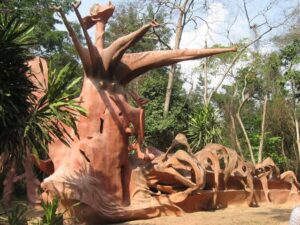Back to: Botany 500 Level
How far, my wonderful Afrilearn botanist?
You don show say you get serious love for learning! Today, we dey take a step deeper into the spiritual world of plants as we look at Sacred Plants in Nigerian Cultures. These plants no just dey important for our daily lives, they also carry deep spiritual meaning, and them dey connect us to our ancestors and the gods we worship.
Sacred plants in Nigerian cultures
In many Nigerian cultures, plants are not only seen as food, medicine, or materials for building—they also serve as sacred symbols. From ancient shrines to local rituals, certain plants carry deep significance. These plants are often worshipped, revered, or protected, as they’re believed to bring blessings, good fortune, and even divine protection. Today, we will uncover these sacred plants and their cultural relevance in Nigerian societies.

Body – Sacred Plants in Nigerian Cultures
- The White Thorn Acacia (Acacia nilotica)
- Cultural Significance: This tree is sacred in many African cultures, including Nigeria. In some communities, the bark and leaves are used in rituals and prayers. It’s believed to be connected to the spiritual realm, acting as a medium between humans and gods.
- Use: It is also used in traditional medicine, especially for treating headaches and wounds.
- The Iroko Tree (Milicia excelsa)
- Cultural Significance: The Iroko tree is often called the “king of the forest” in many Nigerian communities, especially the Yoruba people. It is revered as a spiritual symbol and is believed to house ancestral spirits.
- Myth & Belief: In Yoruba tradition, it is said that Iroko is the home of Orunmila, the deity of wisdom. People often do not cut the tree because of its spiritual significance.
- Use: Its wood is used to create sacred altars, while its leaves are believed to offer protection.
- The Baobab Tree (Adansonia digitata)
- Cultural Significance: Known as the “Tree of Life,” the Baobab holds a special place in many Nigerian cultures. It symbolizes strength, longevity, and resilience.
- Beliefs: It is believed that the Baobab tree is a source of divine energy and protection. In some communities, certain ceremonies and sacrifices are held under its shade, and it is often a gathering point for social and religious activities.
- Use: Parts of the tree (leaves, seeds, and fruit) are used in food and medicine.
- The Palm Tree (Elaeis guineensis)
- Cultural Significance: The palm tree, often associated with prosperity, is sacred in various parts of Nigeria, especially in the South-South and South-East regions. The Yoruba people also see the palm tree as a symbol of fertility and abundance.
- Use: Palm wine, palm oil, and other parts of the tree are used in rituals, particularly during festive occasions and ancestral worship.
- The Odo (Sacred fig tree)
- Cultural Significance: This fig tree (Ficus spp.) is seen as sacred in several Nigerian communities. It is often found near shrines or sacred places, and it’s believed that deities and ancestors are present in these trees.
- Beliefs: In some cultures, the tree is considered a boundary marker between the physical world and the spirit world.
- The Ogun Tree (Ogun’s Sacred Tree)
- Cultural Significance: Ogun, the Yoruba god of iron, war, and craftsmanship, is traditionally worshipped with specific trees, such as the Odu tree. This tree, considered sacred to Ogun, is found near places of worship and is used during festivals in his honour.
- Use: The tree is linked to Ogun’s powers, and it is believed that sacrifices or prayers at the tree can grant the favour of the god.

Why Sacred Plants Matter in Nigerian Culture
- Spiritual Connection: Sacred plants create a tangible connection between humans and the divine or spiritual realm.
- Cultural Preservation: Understanding and preserving these sacred plants help us protect cultural values and practices.
- Medicinal and Ecological Benefits: Many of these plants are not just sacred; they also have medicinal uses and contribute to ecological balance.
- Community and Identity: These plants help define the identity of different Nigerian communities, creating a sense of belonging and unity.
Real Life Gist
Imagine you walk into a rural village in the South-East. You’ll see villagers gathered under the massive Baobab tree, sharing stories, prayers, and even performing healing rituals. Or picture a traditional Yoruba festival where the Iroko tree is central to the event, with the community singing praises and offering sacrifices to honour their ancestors. These sacred plants, and the rituals around them, bring culture and spirituality into everyday life.
Summary:
- Sacred plants like the Iroko tree, Baobab, and Palm tree are key elements in Nigerian cultures.
- They serve as bridges between humans and the spiritual realm, representing deities, ancestors, and cultural heritage.
- These plants also have practical uses in medicine, rituals, and daily life.
Evaluation:
- What tree is considered the “king of the forest” in Yoruba culture?
- How is the Baobab tree viewed in Nigerian communities?
- Why are sacred plants important for Nigerian cultures?
You’ve just connected with the deep spiritual roots of our land. These plants are more than just nature; they are the foundation of our culture, history, and beliefs. Keep exploring, because you’re on the path to becoming a true expert in plants and their place in both nature and culture. Let’s continue this journey together—Afrilearn is with you every step of the way!
